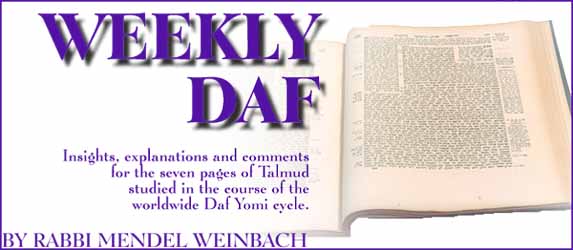Weekly Daf #266
Yoma 72 - 78 Issue #266
29 Adar - 6 Nissan 5759 / 17 -23 March 1999
This publication is also available in the following formats: ![]()
![]()
![]() Explanation
of these symbols
Explanation
of these symbols
A Touch of Awe
The Torah prohibition of eating on Yom Kippur is the principal subject of the final perek of Mesechta Yoma. Did our Sages also prohibit us to touch food on this day, as they did to touch chametz on Pesach (Shulchan Aruch Orach Chaim 446:3), for fear that we may come to eat this forbidden item?
Our gemara, which speaks of a mother handing food to her infant child, is a clear indication that no such ban was instituted. This is codified as law (Orach Chaim 612:10).
The obvious question arises: Why did our Sages find it necessary to forbid touching chametz on Pesach to avoid inadvertently eating it, but did not deem it necessary to institute the same precaution regarding food on Yom Kippur?
Two different approaches are put forward by the commentaries. Magen Avraham (612:16) suggests that on Pesach we eat foods which are not chametz, and we are therefore in an 'eating' mindset. Touching chametz may therefore lead to eating it. On Yom Kippur, on the other hand, our consciousness is focused on not eating anything. It is therefore unlikely that we will forget and eat something simply because we touched it.
Turei Zahav (612:8) proposes a very original solution based on a mishna in Mesechta Demai (4:1) regarding the purchase of suspect produce. If one purchases produce from someone who has no credibility regarding whether that produce was tithed, he must tithe the produce himself before eating it. However, if he forgot to do so before Shabbos, and on that holy day he asks the seller whether he tithed it and the seller says yes, then he may eat it. But if Shabbos is over and he asks him, he may not rely on his response. Why? Because even a Jew who is careless regarding tithing and truth-telling is not suspect of lying on Shabbos. This is due to the fear of Heaven which he senses on that holy day.
If this is true on Shabbos, concludes the Turei Zahav, how much more so on Yom Kippur, when a Jew is involved all day long in prayer, will the awesome mood of the day prevent him from inadvertently eating food, even if he touches it.
Hidden Curse and Hidden Blessing
"Come and see," said Rabbi Yossi, "How different is the way of Hashem from that of man. If one man is hurt by another, he will seek to reciprocate by hurting him in every way he can. How different is the way of Hashem. He cursed the serpent (who induced Adam and Chava to eat from the forbidden Tree of Knowledge, and was condemned to eat dust as his food throughout his life - Bereishis 3:14) and what is the result? It goes up on a roof and finds such food there; it comes down and finds such food there as well."
If subsisting on dust provides such security, it may be asked, why is this considered a curse?
Perhaps we may gain a perspective from a gemara on the next daf. There we learn of Rabbi Shimon bar Yochai's answer to the question: "Why didn't Hashem supply the Jews with a year's supply of manna, rather than compel them to collect it each day?" He compared the situation to a king who supplied his son with a year's supply of provisions. The son came to visit his father only once a year. The king therefore instituted day by day support, and thereafter enjoyed his son's presence every single day. So it was with Israel, concluded the Sage. A father with four or five children to feed was daily concerned that perhaps the manna would not fall from heaven, and that they would all die from hunger. As a result they would all direct their thoughts to their Father in Heaven.
Regular dependence on Hashem is a blessing in disguise, because it creates an intimate relationship between Giver and taker. Hashem required the Jews in the wilderness to face the daily challenge of insecurity and dependence so that their hearts would regularly "visit" their Father in Heaven. In regard to the serpent, however, we may compare it to the son who has fallen from favor; and for whom the father provides his lifetime needs all at once, so that he will not be privileged to contact his father. "The young lions cry out for food and beg G-d for their nourishment," says King David (Tehillim 104:21), and so it is with almost all living things. Only the serpent, the original inciter to sin, is denied this dependence which leads to intimacy.
This indeed is a curse which serves as poetic justice for one who tried to persuade man that if he ate from the forbidden tree, he would gain Divine powers and no longer be dependent on his Creator.
General Editor: Rabbi Moshe Newman
Production Design: Eli Ballon
© 1999 Ohr Somayach International - All rights reserved. This publication may be distributed to another person intact without prior permission. We also encourage you to include this material in other publications, such as synagogue newsletters. However, we ask that you contact us beforehand for permission, and then send us a sample issue.
This publication is available via E-Mail
Ohr Somayach Institutions
is an international network of Yeshivot and outreach centers, with branches in North America, Europe, South Africa and South America. The Central Campus in Jerusalem provides a full range of educational services for over 685 full-time students.The Jewish Learning Exchange (JLE) of Ohr Somayach offers summer and winter programs in Israel that attract hundreds of university students from around the world for 3 to 8 weeks of study and touring.
Dedication opportunities are available for Weekly Daf. Please contact us for details.







